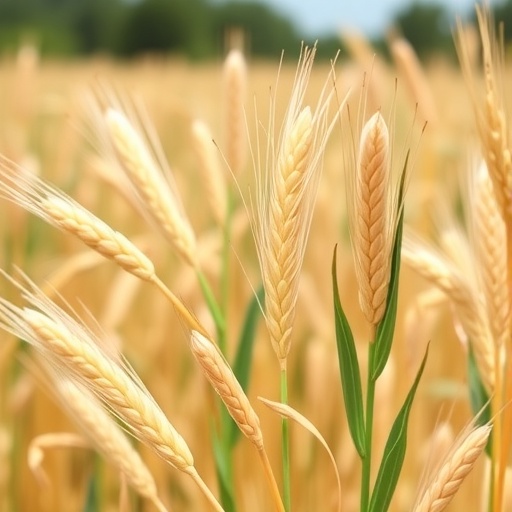The agricultural landscape is rapidly evolving, and researchers are continually seeking efficient methods to enhance crop performance under the constraints of water and fertilizer scarcity. A recent study published in Discover Agriculture sheds light on the comparative performance of summer cereals when subjected to limited water and fertilizer inputs. This pioneering research, conducted by a team led by Ahmed et al., aims to provide insights into sustainable agricultural practices that can be adopted in regions facing climatic challenges and resource scarcity.
At the core of this inquiry lies the examination of various summer cereals, which have long been recognized for their potential to thrive in warmer climates. Cereals such as millet, sorghum, and barley are not only staples in many diets worldwide but also exhibit unique adaptations that allow them to endure stressful growing conditions. This research contextualizes the importance of these crops, particularly in light of climate change and its ramifications on agricultural productivity.
The researchers adopted a systematic experimental approach, conducting field trials to assess the growth and yield of selected summer cereals under controlled water and fertilizer constraints. They meticulously measured various growth parameters, including plant height, leaf area, and soil moisture content. This data collection was crucial in determining how these cereals responded to stressors that are increasingly relevant given the erratic weather patterns associated with global warming.
Results from the study propelled a deeper understanding of the resilience and adaptability of these crops. Notably, findings indicated that while all tested cereals exhibited some level of tolerance to water and fertilizer limitation, certain varieties stood out for their superior performance. For instance, specific strains of sorghum demonstrated remarkable drought resistance while maintaining yield levels that could support food security in challenging growing conditions.
The study further delves into physiological mechanisms that underpin the cereals’ adaptation strategies. Researchers observed significant differences in root development among the varieties, which played a crucial role in their ability to access moisture from deeper soil layers. This adaptive trait can be a critical factor for farmers aiming to cultivate summer cereals in regions where water availability is limited.
Besides physiological traits, the research emphasizes the role of nutrient uptake efficiency in crop performance under constrained conditions. With fertilizers becoming increasingly expensive and their overuse leading to environmental degradation, understanding how different summer cereals utilize available nutrients more effectively is invaluable. This aspect highlights the intersection of agronomy and environmental stewardship, where sustainable practices can be achieved without compromising crop productivity.
In addition to providing quantitative data, the study offers qualitative insights into the potential socioeconomic impacts of adopting these resilient summer cereals. By empowering farmers with knowledge of which varieties to cultivate, regions heavily impacted by water scarcity could see a significant improvement in livelihoods and food security. This could serve as a model for other agricultural systems worldwide, especially those facing similar climatic adversities.
The implications of this research extend beyond just agronomic practices; they touch on policy and educational aspects as well. Awareness campaigns targeting smallholders about the benefits of these resilient summer cereals could assist in transforming agricultural habits that currently depend heavily on conventional practices. A broader understanding of these findings can aid policymakers in strategizing support systems for vulnerable farming communities, ensuring that crop diversification becomes a viable option.
As the scientific community continues to confront the pressing issues of food security and climate resilience, studies like this one play an essential role. They not only uncover pathways for optimizing crop performance under duress but also serve as a rallying point for stakeholders to engage in discussions about sustainable agriculture. Future research may build on these findings, further exploring genetic improvements and biotechnological advancements that can enhance resilience traits in summer cereals.
In conclusion, Ahmed et al.’s research is a critical addition to the body of knowledge in agricultural science. By focusing on the comparative performance of summer cereals under limited resource inputs, the study contributes to the overarching narrative of sustainable development in agriculture. As climate challenges intensify, leveraging such insights will be essential for ensuring food security and fostering resilience among agricultural communities worldwide. This research not only illuminates the potential of summer cereals but also encourages broader investment in agricultural innovation aimed at combating the food crisis rooted in climate change.
The collaborative efforts evidenced in this study serve as a reminder that interdisciplinary and translational research are imperative for addressing complex global challenges. By bridging the gap between scientific inquiry and practical application, the findings pave the way for more resilient agricultural systems that can endure the stresses of an unpredictable future.
The ongoing dialogue in the agricultural sector highlights the critical need for adaptive strategies. As more studies surface, the collective knowledge gained will inform best practices for farmers dealing with limited water and fertilizers, ultimately leading to a more secure and sustainable agricultural future.
Subject of Research: Comparative performance of summer cereals under limited water and fertilizer inputs
Article Title: Comparative performance of summer cereals under limited water and fertilizer inputs
Article References:
Ahmed, U., Iqbal, W., Amin, H. et al. Comparative performance of summer cereals under limited water and fertilizer inputs. Discov Agric 3, 116 (2025). https://doi.org/10.1007/s44279-025-00249-w
Image Credits: AI Generated
DOI: 10.1007/s44279-025-00249-w
Keywords: Summer cereals, drought resistance, water scarcity, fertilizer efficiency, sustainable agriculture, crop performance.




